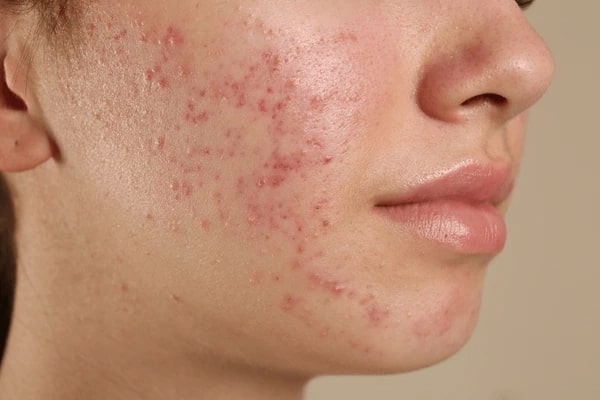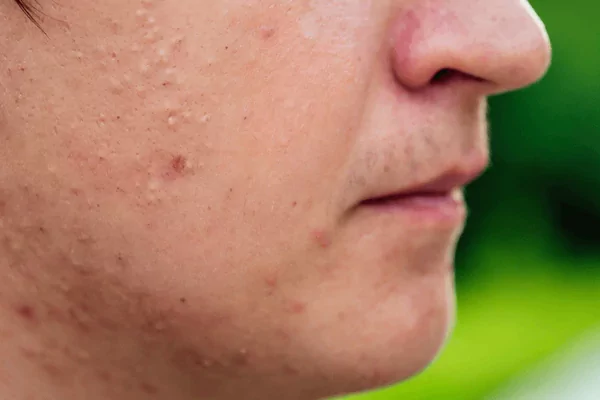Hormonal Acne vs. Bacterial Acne: What’s the Difference and How to Treat Them?
By Dr. Sweta V Nakhawa – Renowned Dermatologist, Cosmetologist & Aesthetic Physician in Thane
Acne is one of the most common skin conditions affecting people of all ages. However, not all acne is the same.
Two major types — hormonal acne and bacterial acne — may look similar on the surface but have very different causes and require different treatments.
As a board-certified dermatologist with over 15 years of experience, Dr. Sweta V Nakhawa specializes in diagnosing and treating all types of acne.
In this blog, we’ll break down the difference between hormonal acne and bacterial acne, their symptoms, causes, and the best ways to treat each type — including professional options like hormonal acne treatment in Thane and bacterial acne treatment in Thane.

What is Hormonal Acne?
Hormonal acne is caused by fluctuations in hormones, especially androgens.
These hormonal shifts can lead to increased oil (sebum) production, clogging pores and resulting in painful breakouts.
This type of acne is common among teenagers but also frequently affects adult women.
Hormonal Acne Symptoms
- Deep, cyst-like pimples under the skin
- Most commonly appears on the jawline, chin, and neck
- Tends to worsen during menstruation, pregnancy, or menopause
- Often resistant to over-the-counter acne treatments
Hormonal Acne Causes
- Elevated androgen levels
- Polycystic Ovary Syndrome (PCOS)
- Stress, which increases cortisol and disrupts hormonal balance
- Use or withdrawal from hormonal contraceptives

What is Bacterial Acne?
Bacterial acne is triggered by the overgrowth of Cutibacterium acnes — a bacteria naturally present on the skin.
When pores get clogged with oil and dead skin, it creates the perfect environment for bacteria to multiply and cause inflammation.
Bacterial Acne Symptoms
- Blackheads, whiteheads, pustules, and papules
- Inflammation and redness
- Can occur anywhere but often appears on the forehead, nose, cheeks, and upper back
- Can be sensitive or itchy
What Causes Bacterial Acne?
- Excessive oil production
- Blocked pores due to dead skin buildup
- Bacterial overgrowth in clogged follicles
- Poor hygiene, pollution, use of comedogenic skincare or makeup
Difference Between Hormonal Acne and Bacterial Acne
|
Understanding the difference between hormonal acne and bacterial acne is the first step toward clear, healthy skin.
How to Treat Hormonal Acne?
Treating hormonal acne requires a combination of lifestyle adjustments and medical intervention.
Lifestyle and Skincare Tips
- Use non-comedogenic, gentle skincare products
- Avoid harsh scrubs or alcohol-based cleansers
- Maintain a consistent skincare routine with mild exfoliants and retinoids
- Eat a balanced diet and manage stress
Medical Treatments for Hormonal Acne
- Oral contraceptives to regulate hormone levels
- Anti-androgen medications like spironolactone
- Topical retinoids to prevent pore clogging
- Chemical peels or laser therapy under expert supervision
Hormonal Acne Treatment in Thane
Dr. Sweta V Nakhawa offers tailored hormonal acne treatments in Thane that address the root hormonal causes.
Her approach includes skin assessments, hormonal evaluations, and advanced treatment plans to manage and reduce hormonal breakouts effectively.
How to Treat Bacterial Acne?
Bacterial acne can often be managed with a proper skincare regimen and antimicrobial treatments.
Topical Treatment Options
- Benzoyl peroxide to kill acne-causing bacteria
- Salicylic acid to unclog pores
- Topical antibiotics such as clindamycin or erythromycin
Oral Medications
- Antibiotics like doxycycline or minocycline
- Oral retinoids for severe or persistent acne cases
Bacterial Acne Treatment in Thane
At her clinic, Dr. Sweta V Nakhawa offers bacterial acne treatments in Thane that combine prescription medications, skincare guidance, and in-clinic procedures such as:
- Acne facials and comedone extractions
- Chemical peels
- LED therapy
- Laser treatments to reduce bacteria and inflammation
Why Choose Dr. Sweta V Nakhawa – Your Trusted Acne Treatment Surgeon in Thane?
With over 15 years of dermatology experience, Dr. Sweta V Nakhawa has helped countless patients regain their confidence through effective, personalized acne treatments.
Whether you suffer from hormonal acne or bacterial acne, she provides expert care using scientifically proven methods.
Her clinic in Thane is equipped with modern dermatology technology and a caring team committed to helping you achieve clear, radiant skin.
FAQs
Q1: How do I know if I have hormonal acne or bacterial acne?
A skin consultation with a dermatologist like Dr. Sweta V Nakhawa can help diagnose the type of acne through clinical examination and, if needed, hormonal testing.
Q2: Can both hormonal and bacterial acne occur at the same time?
Yes, many patients experience a combination of both types. Mixed acne needs a customized treatment plan for best results.
Q3: Is hormonal acne treatable without birth control pills?
Yes, alternatives such as anti-androgens, dietary changes, and non-hormonal topical treatments can effectively treat hormonal acne.
Q4: How long does it take to see results from acne treatment?
Depending on the type and severity of acne, visible improvement can be seen in 4–12 weeks with consistent treatment.
Q5: Are acne treatments safe for sensitive skin?
Absolutely. Treatments are customized by Dr. Sweta to match your skin type and tolerance level, ensuring safe and effective outcomes.
Conclusion
Whether you’re dealing with stubborn breakouts along your jawline or persistent pimples on your forehead, knowing the type of acne you’re facing is crucial.
From understanding what hormonal acne is and what is bacterial acne, to identifying the difference between hormonal acne and bacterial acne, the path to clear skin begins with expert diagnosis and care.
For effective, result-driven acne treatment in Thane
Book a consultation with Dr. Sweta V Nakhawa — your trusted skin specialist and acne treatment surgeon in Thane.
